Attacks On Zarif Continue As Supporters Retaliate Against Raisi

As attacks on Iran's former Foreign Minister Mohammad Javad Zarif continued following his latest policy statements, some media and politicians have defended him.

As attacks on Iran's former Foreign Minister Mohammad Javad Zarif continued following his latest policy statements, some media and politicians have defended him.
Zarif who was the main speaker at a five-hour long audio discussion on the social media app Club House earlier this week, defended his diplomatic approach of negotiations to reduce Western pressure on Iran.
The former foreign minister has long been a target of Iran’s hardliners as the supposed architect of the 2015 JCPOA nuclear deal and allegedly as a man inclined to forge better ties with the West. But in June these attacks intensified as Zarif began to tweet after a long silence.
The Raisi administration-owned daily Iran newspaper wrote Thursday that former Foreign Minister Zarif and former President Hassan Rouhani's foreign policy was nothing more than "begging the West for attention." The daily also charged that their policies were "marked by ignorance, confusion and naivety."
The daily added that Zarif and Rouhani's policies made the Iran's situation and its ties with other countries more complicated than ever. However, the newspaper did not specify its accusations with examples.
The daily wrote that their priority was redefining Iran's relations with the world, but their vision was limited to Europe and the United States. The statement was, of course, mindless of the fact that Iran's 25-year cooperation contract with China was signed under Rouhani with Zarif.

Iran daily also charged that Zarif's foreign policy was limited to furthering the talks over Iran's nuclear program. The daily further charged that Iran's ties with its neighbors were downgraded under President Rouhani.
In fact, it was Iran’s aggressive regional political and military policies and interventions in Syria and Yemen that soured it ties with Sunni Arab states. These policies were part of a grand strategy devised or at least approved by Supreme Leader Ali Khamenei, and not at the presidential level.
While under attack from the conservative camp Zarif said on Thursday that he has no plans whatsoever for the elections and added that he is not the kind of man who would run for the parliament, Zarif said that the controversy over his Clubhouse presence is rooted in the conservative's fear of his possible plans to run for President in 2025. He added that he has no plan to run for the post or to campaign for other politicians.
In the meantime, the editor of Jomhouri Eslami newspaper, Masih Mohajeri suggested that Zarif and his predecessor at the foreign ministry, Ali Akbar Salehi who later played a part in forging the 2015 JCPOA nuclear agreement, should take part in an open debate with the leading hardliners aligned with the current government who have been obstructing the nuclear talks for many years.
Mohajeri wrote that Iranians have a right to know what has happened to the talks and the nuclear program and such a debate can shed light on many ambiguities and show clearly who is right and who is lying about the other sides foreign, economic and domestic policies.
Also defending Zarif on Thursday was the centrist daily Ham Mihan, which attacked the Raisi administration and wrote that the current government portrays a disparaging image of its predecessor and characterizes its performance as "treasonous", while making a lot of fuss about its own meager achievements.
Ham Mihan wrote that the ruling politicians take advantage of the silence of the officials of the previous government and pass unilateral judgements about the Rouhani administration's track record without giving him and his aides a chance to freely respond to the accusations. Ham Miham further lashed out at the Raisi administration for lying about its "achievements" and not tolerating any criticism. The daily claimed that Raisi and his supporters hold more grudges against their political rivals than foreign enemies.
Foreign Policy expert Ghasem Mohebali defended Zarif by saying that what he said showed the difference between two approaches to national interests and the nuclear talks, adding that Zarif's approach was an example of efficiency while the new government's track record has all the signs of inefficiency.
Expediency Council member, moderate conservative politician Mohammad Sadr, on the other hand, defended Zarif and praised his performance regarding the nuclear deal, and attacked Raisi: "I have told Raisi that he is personally responsible for the economic problems resulting from the inconclusive situation of the nuclear talks under his government."